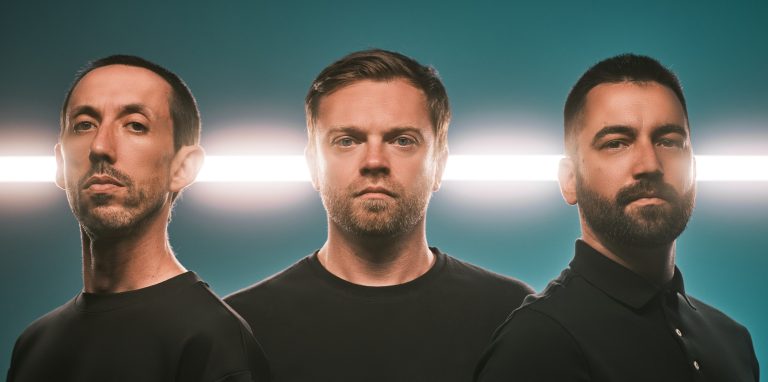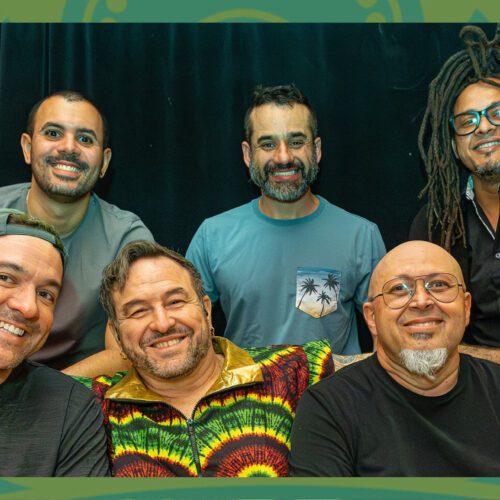Additional Information
Turbine is the association of three French DJs and producers based in Montreal, determined to shake up the codes of scratch music with a project at the crossroads of EDM and the performative dimension of turntablism.
Both the French and American scratch music traditions have their roots in hip-hop culture and the use of turntables as a musical instrument. In the United States, scratch music played an important role in the early development of hip-hop and in the emergence of other electronic music genres, such as techno and house.
In France, scratch music has also been an important part of the electronic music scene, but it has evolved differently. It is sometimes seen as more closely related to the club scene, influenced by genres such as drum and bass, funk and jazz, which has given it a distinct sound and flavor, as exemplified by the groups Chinese Man and C2C. Turbine wishes to differentiate itself from this heritage by exploring sounds belonging to bass music.
The trio competed against the best turntablists in the world at the DMC 2022 Championship a few months ago and came in fourth place, an excellent performance for an emerging group. PAN M 360 took the opportunity to interview Benjamin, Nico and Tony as they have just self-produced their first single, Warm Up, and are in the middle of preparing a live show for 2023.
PAN M 360: Can you introduce yourself in a few words and your role in the group?
Benjamin: I started djing at 17. I quickly got into hip-hop production and it quickly deviated to drum and bass, then to electro. I got really passionate about production, mixing and sound design techniques. Eight years ago, I arrived in Montreal as a video game sound designer. My role in the band is mainly to produce.
Nico: Nico or DJ Noyl, I don’t produce at all or very little, I’m more of a hip-hop DJ by training, then I also knew electro afterwards. Now my career is a mix of DJing and scratching with bands or collectives. The year before the covid more than half of my gigs were scratching in shows.
Tony: In the band, I do a lot of the technical stuff and make sure everything works. I do scratch thanks to Benjamin who showed me that about 20 years ago and when I came to Montreal about 10 years ago, he joined me. Otherwise professionally I am a sound designer, and I do sound editing.
PAN M 360: Benjamin and Tony, you have known each other for a long time. Nico, how did you come into the equation?
Nico: That’s a good question. I guess by scratching, we must have crossed paths at events.
PAN M 360: Precisely, what can you tell me about the scratch scene in Montreal, what are the important places?
Nicolas: There are quite a few scratchers. There are monthly events with a live band and then like four or five turntables and then you can go scratching open decks in a bar. It’s a small platform for everyone. There’s pretty much every level. The problem is that the scratch community doesn’t have a lot of spaces to meet. There are a few events. We find scratch music in Franco fest, because Monzo, who manages that, he is a bit plugged anyway. So during the all-nighter, he has a spot during the Franco, he has a spot and a kind of hip-hop table on Sainte-Catherine street. Otherwise there was the Killa Jewel concert at Ausgang. Except for the West Shefford, which offers us a place every Sunday, there are not so many fixed events or big parties like in the old days when I arrived.
Benjamin: The 180g used to host parties too sometimes.
PAN M 360: In the context, what pushed you to create the Turbine project?
Nico: The desire! And then there is a lack. It’s a memory of a Facebook status from 10 years ago that started the thing that came back on my wall where I said, it’s weird, there is no scratch. And then I sent a message to Benjamin and Tony. Two days later, we had a beer, two days later, we were in rehearsal. It was done quite quickly.
PAN M 360: How does your creative process work?
Tony: It’s not a very traditional creative process compared to a rock or rap band where you come up with an instrumental version, lyrics, you sing, you record, it makes a single, then you pile up singles, it makes an album. It’s more complicated in the sense that we start by producing tracks, we redistribute the music to reappropriate it to be able to play it, so that it’s pleasant to listen to and to see. The goal of the project, the vision of the project, it is, it is to make something, a true show in live, it is what is rather powerful. And it’s nice to watch a show, you know, not just 3 guys pushing records.
Nico: Except for the first single “Warm Up” that we produced together, for the moment all the productions we use are Benjamin’s. We need to put together an hour of music. We need to put together an hour of live music pretty quickly and as Tony says, it’s a very slow process. We have to produce, do triple exports to share them the first time; re-export them to put them on vinyl, because we have to place the sounds in certain places to be able to scratch them. After that, we have to work dozens and dozens of times so that it fits and you can’t hear the scratches too much. It’s a lot of work.
PAN M 360: Is it particular to want to make scratch music without letting you hear the characteristic sounds of scratching (attacks, etc.)?
Tony: The goal of the game is to keep it musical, danceable and accessible and listenable.
Nico: Yes, it should not be scratched. I had Skills, who is the DMC world champion, listen to our single “Warm Up.” He told me – even though he is scratch champion – “there is too much scratch”. Because he understood the intention we had, which was to make a hyper dancing thing, to listen to in your living room, but the most possible to dance. So we try not to do too much or to be as musical as possible with the scratch, not to be too technical.
PAN M 360: Did you adopt the same approach for the DMC World Championship 2022 in which you participated and won the 4th place?
Nico: The DMC you can spread a little more. But the same thing if you put too much… Besides you have four judges watching you and they will see the mistakes, it is better to do less. Our 6 min DMC is our 25 min compressed show. We adapted it to be more visual, that’s why we change more decks, we move around. It was very electronic for the DMC what we did anyway, too much maybe. The intention was to show our tracks and I think there are a lot of people who didn’t understand that they were our tracks. After that it was good publicity, it’s good on the resume, we represented Canada at the world championship, so it’s still cool!
























